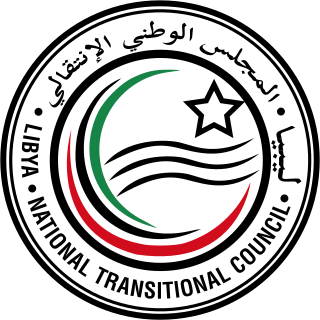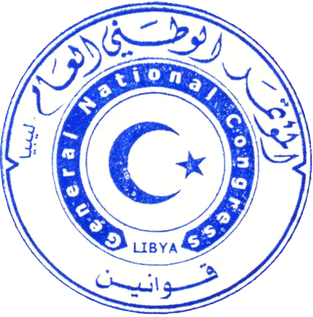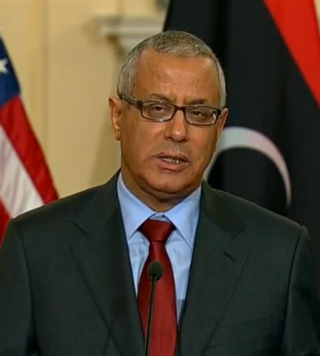
Libya's history involves its rich mix of ethnic groups, including the indigenous Berbers/Amazigh people. Amazigh have been present throughout the entire history of the country. For most of its history, Libya has been subjected to varying degrees of foreign control, from Europe, Asia, and Africa.
The political system of Qatar is a semi-constitutional monarchy with the emir as head of state and chief executive, and the prime minister as the head of government. Under the Constitution of Qatar, the partially-elected Consultative Assembly has a limited ability to reject legislation and dismiss ministers. The first general election was held in 2021.

Sheikh Tamim bin Hamad Al Thani is Emir of Qatar, reigning since 2013.

The National Transitional Council (NTC) was a transitional government established in the 2011 Libyan civil war. The rebel forces overthrew the Libyan Arab Jamahiriya of Muammar Gaddafi. The NTC governed Libya for a period of ten months after the end of the war, holding elections to a General National Congress on 7 July 2012, and handing power to the newly elected assembly on 8 August.
General elections were held in Qatar for the first time on 2 October 2021, following an announcement by the Emir of Qatar on 22 August 2021. The elections for the Consultative Assembly were originally scheduled to be held in the second half of 2013, but were postponed in June 2013 until at least 2016. In 2016 they were postponed again. Finally, in November 2020, Emir Tamim bin Hamad Al Thani pledged to hold the election in October 2021.

The aftermath of the 2011 Libyan civil war has been characterized by marked change in the social and political order of Libya after the overthrow and killing of Muammar Gaddafi in the civil war that was fought in Libya in 2011. The country has been subject to ongoing proliferation of weapons, Islamic insurgencies, sectarian violence, and lawlessness, with spillovers affecting neighboring countries including Mali.

The General National Congress or General National Council was the legislative authority of Libya for two years following the end of the First Libyan Civil War. It was elected by popular vote on 7 July 2012, and took power from the National Transitional Council on 8 August.

Ali Zeidan is a former Prime Minister of Libya. He was appointed by the General National Congress on 14 October 2012, and took office on 14 November after Congress approved his cabinet nominees. Prior to the Libyan Civil War, Zeidan was a Geneva-based human rights lawyer and according to the BBC, he is considered by some local observers as a strong-minded liberal. He was ousted by the parliament committee and fled from Libya on 14 March 2014. However, he told the press conference in Rabat, Morocco, that the ousting was invalid.
Salah Bashir Marghani is a Libyan jurist, and the former justice minister in the post-civil war government of Libya. He was part of Prime Minister Ali Zeidan's initial cabinet and took office on 14 November 2012.

Ahmed Omar Maiteeg is a Libyan businessman and politician originally from Misrata, who was elected Prime Minister of Libya in May 2014. He was appointed head of the transitional government, and asked to form his cabinet and present it to the GNC for a confidence vote within 15 days.

The Libyan House of Representatives (HoR) is the legislature of Libya resulting from the 2014 Libyan parliamentary election, which had an 18% turnout. In late 2014, following the failed coup attempt to take over the capital Tripoli in the context of the Libyan Civil War, the House of Representatives relocated itself to Tobruk in the far east of Libya. Several HoR sessions were held in Tripoli in May 2019 while Tripoli was under armed attack, electing an Interim Speaker for 45 days. Between 2014 and 2021, the House of Representatives supported the Tobruk-based government led by Abdullah al-Thani before supporting the incumbent Government of National Unity led by Abdul Hamid Dbeibeh. In September 2021, the House of Representatives passed a no-confidence motion against the interim GNU government.

Abdullah al-Thani is a Libyan politician who became prime minister of the House of Representatives of Libya on 11 March 2014, when he took over in an interim capacity after the dismissal of Ali Zeidan. He was previously the defence minister in the government of Zeidan.

The Government of National Accord was an interim government for Libya that was formed under the terms of the Libyan Political Agreement, a United Nations–led initiative, signed on 17 December 2015. The agreement was unanimously endorsed by the United Nations Security Council, which welcomed the formation of a Presidency Council for Libya and recognized the Government of National Accord as the sole legitimate executive authority in Libya. On 31 December 2015, Chairman of the Libyan House of Representatives, Aguila Saleh Issa declared his support for the Libyan Political Agreement. The General National Congress has criticized the GNA on multiple fronts as biased in favor of its rival parliament the House of Representatives.
This is a detailed timeline of the Second Libyan Civil War which lasted from 2014 to 2020.

The first cabinet of Abdullah al-Thani was in power from 11 March until 29 August 2014, when it resigned so that the newly elected House of Representatives could create a new government.
The 2020 Libyan protests consisted of street protests over issues of poor provision of services in several cities in Libya, including cities controlled by the Government of National Accord (GNA) in the west and by the Libyan National Army (LNA) in the east (Benghazi) and south (Sabha) of Libya.
The following lists events that happened during 2021 in North Africa.

The Government of National Unity is a provisional government for Libya formed on 10 March 2021 to unify the rival Government of National Accord based in Tripoli and the Second Al-Thani Cabinet, based in Tobruk. Abdul Hamid Dbeibeh is the Prime Minister of the unity government and was selected in the Libyan Political Dialogue Forum on 5 February 2021. It is de facto backed by the governments of Turkey, Qatar, Algeria, Pakistan and Palestine.











